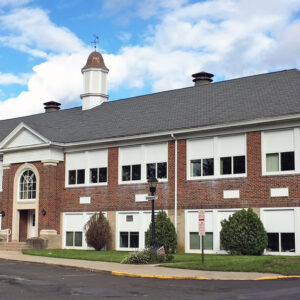The Pennsbury School District, which settled a federal First Amendment case in 2022 for $300,000 over violating residents’ rights, is again looking to change its policy regarding speakers.
The policy change, considered by the school board’s policy committee on Thursday, precludes speakers from playing an audio or video during their time at the podium. The committee agreed to discuss the policy change again at its next meeting in March.
The comment policy in place now (903) was approved by Judge Gene E. K. Pratter and was written by a lawyer for the district’s insurer. As part of the settlement, Pennsbury was required to pay the $300,000 for the plaintiff’s attorney fees and a symbolic $17.91 (the year the first Amendment was ratified was 1791) to each plaintiff.
Two residents who were plaintiffs in the First Amendment case came to the policy committee meeting to express their dismay about the proposed change and to warn the board members they might once again be facing a federal judge.
Robert Abrams, a resident, said, “The insurance company paid for the policy to be rewritten. This is free speech. You are telling people what they can say, how they can say it, and what they can use to put their point across. Clearly, you’re heading back to federal court.”
Abrams added, “The insurance company has already told you they will not defend you if it happens again. And the public here has to start with making you people personally liable. Because it’s ridiculous that the taxpayer keeps paying and paying and paying here for your stupidity.”
Parent Tim Daly, who was also a plaintiff, questioned whether the change would violate a disabled person’s rights under the Americans with Disability Act, perhaps someone who cannot speak in public.
School Board Member Jim Prokopiak said, “I don’t have any problem with them playing something that is part of the official board record.” But Prokopiak did object to speakers ceding their time to people who are not in the room by playing a recording.
“People can come in and say whatever they want at meetings, but I don’t think they can come in and say, ‘Well, this third party.’ Under our policy, they’re supposed to sign in…in terms of an ADA situation like that, someone doesn’t have to speak, and they want to record their comments at home and bring it in; it’s still their comments… That’s a reasonable thing,” said Prokopiak.
Prokopiak, a Democrat, is running against Falls Township residence Candace Cabanas in the special election Tuesday for state representative in the 140th District.
Commmitte Chair Dr. Joanne Delwiche said, “We have had people who played recordings of people not in the room. It’s not a wholly hypothetical situation…There is also a concern brought up that it’s potentially a copyright violation because you’re playing the property of other individuals. And then we would be inadvertently broadcasting somebody else’s owned copyrighted material.”
District Solicitor Erin Aronson said ceding one’s time remains in the policy.
“I view this (change) as a clarification of what the ceding of time is. It really just clarifies when you’re ceding your time. Also if you go up and you say you’re going to play the recording of another person. I do that, personally, as a manner of ceding time,” she said.
“In terms of the disability piece of it, it’s an interesting point. We obviously don’t want to discriminate against anyone. You know, cause them not to participate in public comment because of their disability.”
“But the ceding of time provisions, ones I’ve seen in policies since the last decision. This would survive that judicial scrutiny. If Mr. Prokopiak has questions about the wording, you are entitled to enact reasonable time, place, and manner provisions on speech.” And if allowed, a “non-stakeholder” could displace a Pennsbury student or parent who wanted to talk,” Aronson said.
Delwiche said, “The appealing thing about we don’t allow audio or video… It’s unambiguous. It’s not subjective. You’re not making a decision on the fly.”
And no copyrights would be violated. As for the ADA accommodations, “I don’t know how you write that in,” she said.
Lawyer Chadwick Schnee told DVJounral, “In order for a government agency to impose restrictions on speech during public meetings, such a restriction has to be a ‘reasonable time, place and manner’ restriction. The key element here is that there appears to be no justifiable reason for not allowing the public to play audio or video during the time for public comments. If there’s no reason for imposing such a restriction, I don’t see how it would be ‘reasonable’ for purposes of the First Amendment.
“I am also concerned that this restriction may be being considered as a reaction to speech from one particular member of the Pennsbury School District community, who, by playing audio or video footage, may have expressed points of view that the school board dislikes. The district cannot engage in viewpoint discrimination, and I am very concerned that the board may be setting itself up to face another First Amendment lawsuit if it decides to implement such a policy.”
Asked about the copyright issue, Schnee said, “I believe this would constitute fair use, especially where, here, the comments are not being used for any kind of financial gain, either by the speaker or by the district.”
Afterward, Daly said, “The actions of the politically driven school board members come as no surprise. Politics come before the kids. Any change to Policy 903 that allows an opinionated interpretation of the public comment element is a violation of federal law per the previous injunction ruling. Attempting to expand the ‘ceding time’ clause is simply a cover strategy to chill speech that they don’t agree with. And suggesting legal issues arising from a copyright claim is laughable on every level, as such legal issues are frankly non-existent. They just want to censor their constituents who have a different opinion.”
Please follow DVJournal on social media: Twitter@DVJournal or Facebook.com/DelawareValleyJournal

